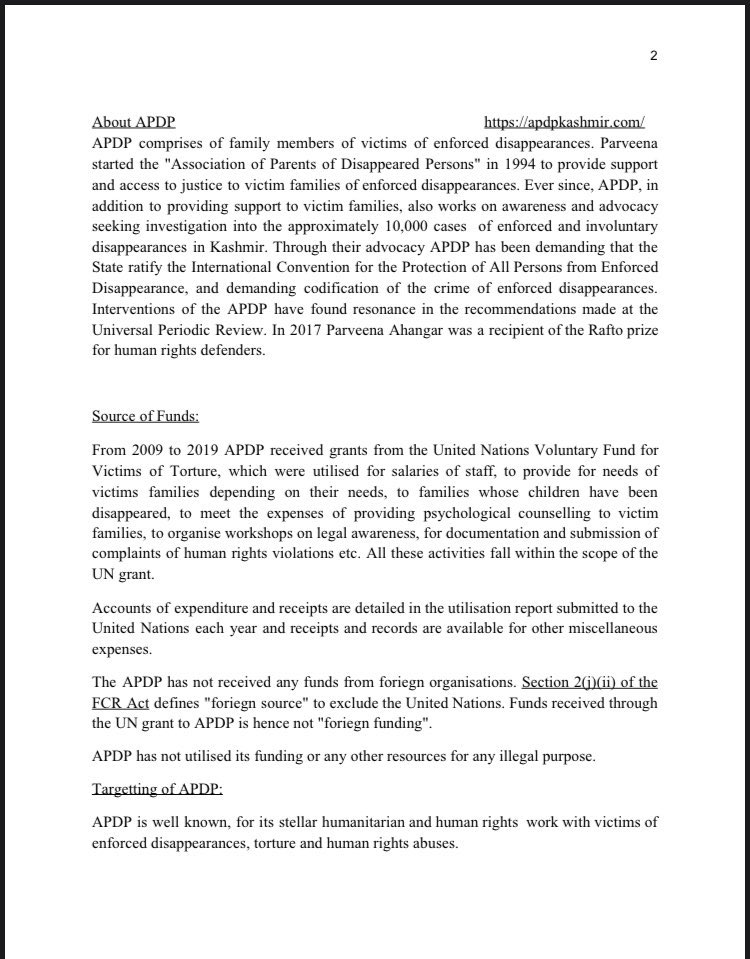
Urgent Update Regarding the NIA Raids on HRDs in Kashmir:
This morning the National Investigation Agency (NIA) conducted a raid on Praveena Ahanger's house, and subsequently on the office of Association of Disappeared Persons (APDP) in Hyderpora in Srinagar.
This morning the National Investigation Agency (NIA) conducted a raid on Praveena Ahanger's house, and subsequently on the office of Association of Disappeared Persons (APDP) in Hyderpora in Srinagar.
This seems to be a premeditated and planned assault. Last week, the local CID and IB officials called up Parveena Ahanger a few times and demanded information regarding the staff and the organisation. All details were duly provided to them.
Earlier, we had received the news that Khurram Parvez’s home was being raided by the NIA, along with six other places including residences of senior journalists, office of newspaper Greater Kashmir and other NGOs engaged in healthcare and social service.
This is a clear case of reprisal and crackdown on human rights defenders (HRDs) in Kashmir. Our voices are being brutally crushed. Our demand for justice is being criminalized.
It is important to note that APDP, led by Parveena Ahangar, has been supported since the last nine years by UN funds from the UN Voluntary Fund for Victims of Torture (UNVFVT). In July 2020, APDP had received an emergency grant from UNVFVT.
In September 2020, APDP had submitted almost 40 testimonies of victims who were subjected to arbitrary detention and torture by security forces in Kashmir to the Working Group on Arbitrary Detention and the UN Special Rapporteur on Torture.
To be updated further.
To be updated further.
Parveena Ahanger of @_APDP has released a statement about the raid on their offices today 



The @_APDP is a human rights organisation started in 1994 by family members of victims of alleged enforced disappearances. The organisation provides support to such families, collects testimonies, raises awareness and engages in advocacy work.
NIA claims the raids were an investigation into funding for “secessionist and separatist activities”. In a statement, APDP founder Praveena Ahangar has strongly denied any such associations, and said the group has been targeted in the past for its work bringing out HR abuses.
The documents the NIA has seized, Ahangar continues, contain sensitive information about victims and their families, and their testimonies.
“There is a grave apprehension that the same may be accessed by other agencies, and/or lead to adverse consequences and reprisal against victims and families who have testified and are pursuing justice,” the statement says.
Read the full text of Ahangar’s statement below.
On 28th October 2020 from about 8:30 A.M to 3:30 P.M, a team of officers from the NIA, CID and JK Police, accompanied by CRPF officers conducted a raid in the office of Association of Parents of Disappeared Persons (APDP) in Hyderpora, Srinagar.
Parveena Ahangar and Saima were taken from home to the APDP office by the team and security personnel. Parveena Ahangar, Sabia and Saima were present in the office during the raid. All information and material sought by the raiding team was provided to them.
The team examined all documents relating to APDP’s work. They subsequently seized several documents and some electronic devices. Praveena Ahanagar’s mobile phones were also seized.
👇🏼👇🏼Serious Concern over misuse of sensitive information, including names and addresses of victims present in documents seized from APDP and apprehension of reprisal against victims of human rights violations:
Through the years APDP has documented and recorded testimonies of victims and victim- families who have been subjected to human rights violations by security forces in Kashmir.
More than 1000 testimonies of enforced disappearances, about 400 testimonies of pellet gun injuries, about 300-400 testimonies of arbitrary detention and torture and some cases of sexual violence have been documented by APDP
+ and have been submitted to various United Nations special procedures, and Human Rights Organisations.
As recently as September 2020, almost 40 testimonies of arbitrary detention and torture that took place in 2019-2020 were submitted to the Working Group on Arbitrary Detention and the Special Rapporteur on Torture.
The documents and devices seized by the NIA team contain details of the names, identities and incidents of human rights abuses by security personnel.
There is a grave apprehension that the same may be accessed by other agencies, and/or lead to adverse consequences and reprisal against victims and families who have testified and are pursuing justice.
Source of Funds
From 2009 to 2019 APDP received grants from the United Nations Voluntary Fund for Victims of Torture , which were utilised for salaries of staff, to provide for needs of victims families depending on their needs, to families whose children have been disappeared+
From 2009 to 2019 APDP received grants from the United Nations Voluntary Fund for Victims of Torture , which were utilised for salaries of staff, to provide for needs of victims families depending on their needs, to families whose children have been disappeared+
+ to meet the expenses of providing psychological counselling to victim families, to organise workshops on legal awareness, for documentation and submission of complaints of human rights violations etc. All these activities fall within the scope of the UN grant.
Accounts of expenditure and receipts are detailed in the utilisation report submitted to the United Nations each year and receipts and records are available for other miscellaneous expenses.
The APDP has not received any funds from foreign organisations. Section 2(j)(ii) of the FCR Act defines “foreign source” to exclude the United Nations. Funds received through the UN grant to APDP is hence not “foreign funding”.
APDP has not utilised its funding or any other resources for any illegal purpose.
• • •
Missing some Tweet in this thread? You can try to
force a refresh


